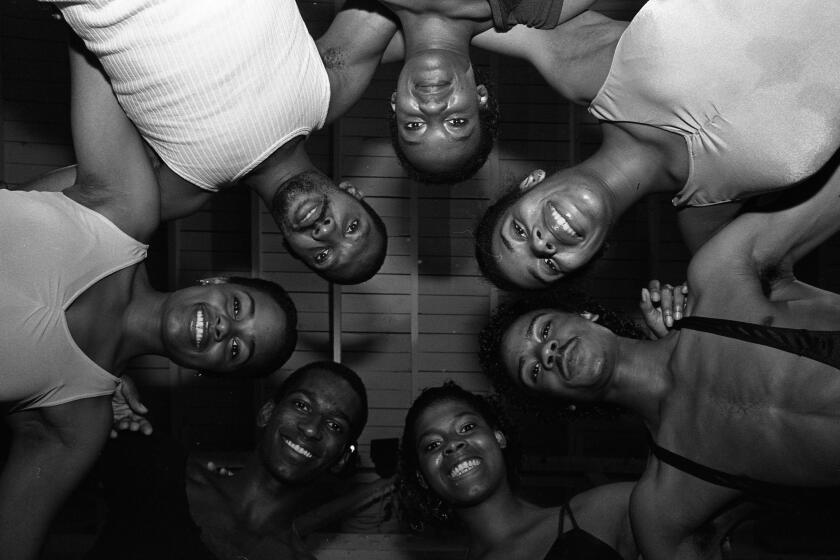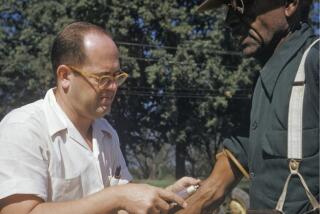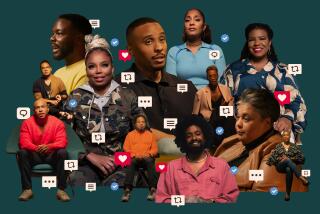Legacy of rights era: Cynicism
- Share via
This story originally ran in 1982 as part of the “Black L.A.: Looking at Diversity” series. We have preserved the original text in order to provide an accurate account of the work in print.
The turbulent civil rights struggles of the 1950s and 1960s spawned a middle generation of blacks in Los Angeles that is more cynical and distrustful than other blacks.
Clinging to an idealistic view of an integrated society, this generation—blacks between the ages of 30 and 44—supports busing but dislikes and distrusts whites and is dissatisfied with life for blacks today in significantly greater numbers than older and younger blacks. At the same time, this generation is more affluent than other blacks.
These views emerged in a Los Angeles Times Poll in May that surveyed by telephone 522 blacks, 216 Latinos and 701 Anglos throughout Los Angeles County. The poll has a margin of error of plus or minus 4%.
The blacks in this middle generation grew into adulthood during the civil rights era, a factor that sociologists say accounts for the difference between their attitudes and those of other blacks.
The oldest among them was 16 in 1954 when the U.S. Supreme Court paved the way for school desegregation by ruling that racially separate schools were unequal. The youngest was 16 when civil rights leader Martin Luther King Jr. was assassinated in 1968.
Interestingly, a similar divergence from mainstream opinion does not exist among their white counterparts who also grew up during that period of protest that spawned campus rebellions, hippies, yippies, the peace movement and an anti-Establishment sentiment among many of the nation’s youth. Despite their experiences, these whites hold views consistent with those of younger and older whites.
“This (black middle generation) is a group that defines their lives by that period,” said sociologist Melvin Oliver, an assistant professor at UCLA who specialized in race relations. “Their involvement in that social movement, no matter how peripheral, makes that time a central point of their lives.
“They are idealistic and philosophically liberal, but an acute sense of pessimism is built into their lives. They still feel a sense of failure, that in spite of this great movement that achieved some very worthwhile things—like access to social facilities, equal pay for equal work—very little has changed for the masses of black people.”
They are a group whose “psyche was forged in battle,” said I.A. Lewis, Times Poll director. Because they matured in an age when racial “distinctions were made and nurtured,” he said, they feel less assimilated into mainstream America and express more hostility toward whites than do older or younger blacks.
This is illustrated most dramatically by their response to the question, “How do you feel about whites you come in contact with?” Almost one in five said they dislike most whites they meet. Fewer than one in 100 other blacks surveyed gave that response.
Correspondingly, when asked how they think most whites feel about them, 15% in the group said they think whites dislike them, compared to only 6% of older and younger blacks.
(Among whites, 4% said they dislike most blacks they meet, a percentage that was relatively standard across age groups. Five percent of the whites said they think most blacks dislike them.)
In the summer of 1982, The Times published a series on Southern California’s Black community called “Black L.A.: Looking at Diversity.”
Blacks ages 30 to 44 also are more inclined to distrust whites. Half, for instance, said they believe whites oppose busing because they do not want the races to mix, while 37% of other blacks gave that answer.
Seventy-one percent of the whites polled said they oppose busing because they do not want their children traveling long distances by bus. Only 12% cited opposition to interracial socializing as the reason they oppose busing.
Oliver said he is not surprised that these middle-generation blacks are so suspicious of white motives.
“As the civil rights movement evolved, there was more mistrust placed in whites and for some blacks (that) belief still holds,” he said.
“That period is stamped in many of (their) minds by the attack on the court decision (mandating desegregation of Southern schools) by southern whites. They just came right out and said, ‘We don’t want black kids going to school with our children because we don’t want to have to deal with miscegenation.’ Blacks who grew up during that period haven’t forgotten that.”
Their cynicism is also reflected in their views on the public school system and black children. When asked why some blacks favor busing, 60% in the middle generation said because they believe the authorities care more about schools attended by white children than those attended by blacks. Only 36% of other blacks gave that answer.
And while 41% of younger and older blacks said there is no difference in educational quality at black and white schools in Los Angeles, only 16% of the middle generation agreed.
Blacks in this group are the firmest believers in integration—supporting busing (51% compared to 31% of other blacks) and expressing a strong preference for integrated schools and neighborhoods. For example, 63% said they believe black children get the best education at integrated schools, compared to 31% of the rest of blacks.
More of the middle generation hold an unfavorable impression of the police than other blacks surveyed—57% to 41%. And more than 25% said they have been stopped by the police in the last 24 months, compared to 7% for the rest of blacks polled. (Among whites, 9% said they have been stopped by police, with the highest—17%—among whites from 18 to 29 years old.)
Those between 30 and 44 have the highest incomes among blacks surveyed. Almost half—48%—have household incomes of $20,000 or more annually, compared to 32% of the overall black population. Only 19% of the blacks between the ages of 45 and 64 said they earned $20,000 or more a year. Yet they rank money lower than do other blacks in importance to improving conditions for blacks.
Even though their financial status is a measure of achievement, blacks between 30 and 44 are the least satisfied with conditions for blacks and are the least optimistic about the future.
Almost eight of every 10 in this middle generation said conditions for blacks in regard to housing, education, job opportunities and social acceptance by whites are “not very good” to “poor,” compared to just more than half of other blacks.
Ten years from now, those conditions will still not be good, according to 42% of those between 30 and 44, while fewer than 25% of other blacks expressed that view.
“They are a group bereft of a sense of how to go about achieving their goals, Prof. Oliver said. “They don’t see how things can be changed (for the better). If the movement of the 1960s couldn’t succeed, they ask themselves, then is there any hope for things to improve?”
The positioning of the middle generation explains why it perceives black progress differently from other blacks, Oliver said.
“The younger blacks never felt the oppression that (those 30 to 44) can remember,” he said, “and the older blacks didn’t expect as much from the movement. That middle generation saw that, in spite of the gains the movement made, very little really changed for the average black person.”
The middle generation group generally agreed with other blacks that voting education and religion are the three most important ways to improve black conditions.
But the middle group gave the legal system and peaceful demonstrations higher marks as agents of social change than did other blacks, perhaps reflecting the prominent role both played in securing basic rights for blacks during the 1950s and ‘60s.
The middle generation also expressed a stronger belief in the efficacy of traditional civil rights organizations—groups that were in their heyday during the 1950s and 1960s.
Belief in Organizations
For example, 92% said the National Assn. for the Advancement of Colored People has helped improve conditions for blacks, compared to 77% of other blacks.
Eight of 10 in the middle group held the same belief about the Urban League, compared to just over half of other blacks.
Blacks between 30 and 44 also are more disenchanted with the performance of black elected officials. One out of three said black elected officials have “done nothing” or hindered black progress, compared to only one in 10 among other blacks.
More to Read
Sign up for Essential California
The most important California stories and recommendations in your inbox every morning.
You may occasionally receive promotional content from the Los Angeles Times.















